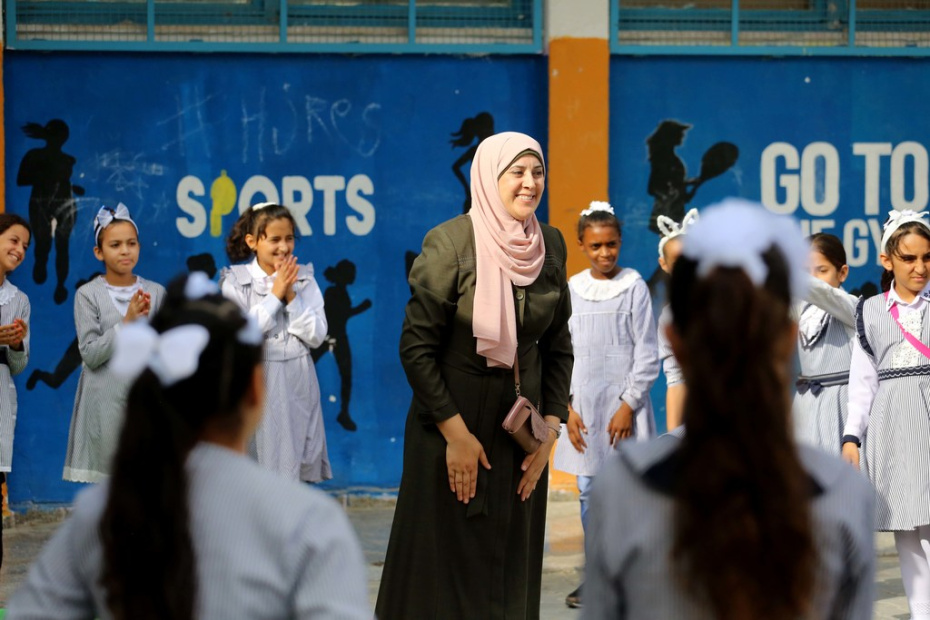UNRWA chief reports on despair and hope among Palestinians, as US announces $150 million in aid

Philippe Lazzarini, Commissioner General of the UN Relief and Works Agency for Palestine Refugees, UNRWA, briefed Member States during an online meeting to mobilize political and financial support ahead of a donor conference later this year.
His report came just hours before the United States Government announced that it was to restart economic, development and humanitarian assistance "to the Palestinian people", including $150 million in assistance for UNRWA.
The overall package includes $75 million for the West Bank and Gaza, and $10 million for peacebuilding programmes, via the US Agency for International Development, according to the announcement from the US State Department.
At the beginning of 2018, the previous Trump administration decided to cut back its funding for UNRWA by around $300 million - the largest reduction in funding, in the history of the UN relief agency, leading to a severe financial crisis.
Spectre of death
“Last week, I was in Ein El Hilweh Camp in South Lebanon, and a young unemployed Palestinian refugee told me he constantly asks himself whether he would die from COVID, from hunger, or while trying to cross the Mediterranean on a dinghy,” Mr. Lazzarini told ambassadors participating in the meeting organized by the UN Committee on the Exercise of the Inalienable Rights of the Palestinian People, held online.
“People are struggling daily to ensure one meal for the family. No one should be made to feel so desperate. No one should have to choose from these three deadly options.”
An incredibly challenging year
UNRWA supports some 5.5 million Palestinians in Jordan, Lebanon, Syria, the Gaza Strip and the West Bank, providing education and primary health care, as well as humanitarian and social services.
Despite persistent funding shortfalls, staff have maintained all critical services, Mr. Lazzarini said, thus rendering the agency “a pillar of stability” for those who depend on its operations.
Gwyn Lewis, Director of UNRWA Operations in the West Bank, said 2020 was incredibly challenging, with the looming threat of annexation, leading to a breakdown in coordination between Israel and the Palestinian Authority early in the year. And then the pandemic hit.
“We have seen a quite dramatic impact on the economy”, she said, outlining some of the damage, such as a decline in household incomes and rising unemployment, which has reached 23 per cent in the West Bank and 49 per cent in Gaza.
These dire socio-economic conditions are occurring in parallel with issues related to the ongoing occupation of Palestinian territory, and the more than decade-long blockade on Gaza.
While challenges will continue into 2021, Mr. Lazzarini pointed to signs of optimism and opportunity, including the possibility of renewed funding from the United States, first reported on Wednesday.
Reported US cash injection imminent
Earlier in the meeting, the Palestinian Permanent Observer to the UN, Riyad Mansour, mentioned unconfirmed news reports indicating that the Biden administration was preparing to deliver $150 million in assistance.
“This would be a very needed significant amount of money to address the challenges that UNRWA is facing”, said Mr. Mansour “and perhaps it is a good omen that we are meeting today".
Mr. Lazzarini, speaking before the official announcement, said that it would represent US re-engagement with UNRWA, and timely support for its programmes.

“Another important opportunity I see is that the global pandemic has pushed all of us into accelerated digital transformation. And digitalization is not new to UNRWA and our staff,” he added.
UNRWA switched to providing telemedicine “almost overnight”, and even developed a mobile app to assist pregnant women, and people suffering from diabetes and hypertension. The agency also established an IT hub in Gaza which now serves all UN entities.
“This has created new job opportunities in a place that sadly holds the world record for unemployment”, he said.
Mr. Lazzarini is an advocate for digital learning. Later this month, UNRWA will launch its first online learning platform so that students can continue their education while classrooms remain shuttered due to the pandemic or conflict.
“In the field of education, going digital means that Palestine refugees acquire the skills needed to remain competitive in a very rapidly evolving labour market”, he said. “I believe that we should not miss the train of digitalization. We owe this to the half a million girls and boys in our schools.”

